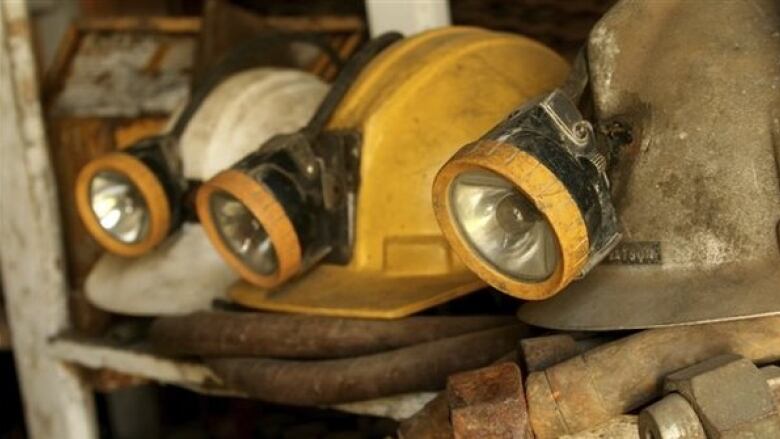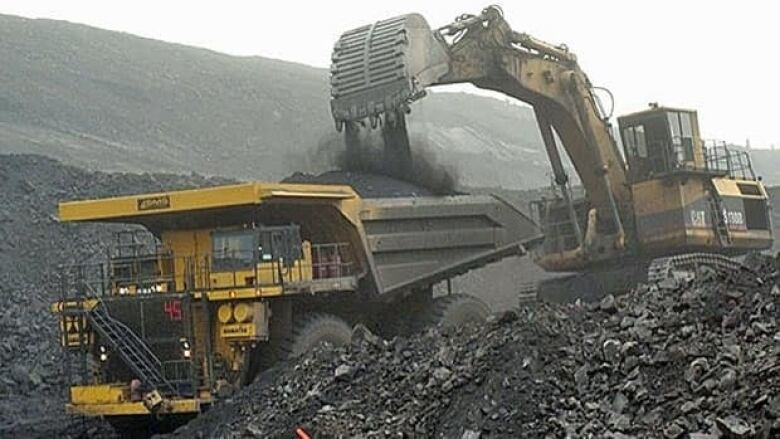Commodity price slump undercuts mining sector
Chinese demand kept Canadian mines humming - now there's too much supply of metals, minerals

The bottom has fallenout of the commodities market and while Canadian mining firms look set to ride it out, there could be a hit to the Canadian economy because of low metals and minerals prices.
At the end of December:
- coal is down 32 per cent from its price at the end of last year;
- iron ore, -24 per cent;
- palladium, -30 per cent;
- copper, -25 per cent;
- zinc, -30 per cent;
- aluminum, -19 per cent.
They're all mined or producedin Canada, part of an industry that employs 380,000 Canadians, dominates the stock market and is a key driver of the economy, contributing $54 billion to domestic GDP in 2013.
"It's so connected to so many parts of the economy. There is a huge mining ecosystem in Canada," says Pierre Gratton, president and CEO of the Mining Association of Canada.
Since the 2008 financial crisis risk capital has moved away from the exploration industry- Pierre Gratton, Mining Association of Canada
And the cracks are starting to show.
In 2015,Canadian mining companies were cutting jobs, selling uneconomic assets and engaged in wide-spread cost-cutting.
Mines are being closed worldwide Anglo American is laying off85,000 people.Glencore is selling off assets in an effort to handle debt and Teck is looking at shutting or pausing operations at mines for steelmaking coal including Canadian mines.
A long, painful downturn

The main reason is China, says Dina Ignjatovic, an economist at TD Economics.
"China is the biggest consumer of base metals and responsible for the biggest uptake in demand over the last few years," she said.
- Copper at 6-year low as demand from China wanes
- China's market woes could be chance to 'reset' Canadian economy
Now China is pulling back on imports of metals and minerals as its economy slows.
"Its slowdown not only resulted in a drop in demand, it also is closely watched by traders, who drove prices down," Ignjatovic said.
China invested a lot of money in buildings, roads and bridges over the past five years, projects that require zinc, nickel, aluminum and other Canadian commodities.
So while the rest of the world was suffering through a prolonged slowdown post-2009, Canada's economy was humming along, in part on the strength of its exports of metals and minerals.
Oversupply of everything
And mining firms were investing in new mines and boosting output to meet that demand.Which means, with China cutting back, there is oversupply now of almost everything.
That doesn't mean the mining sector is in trouble, says Jessica Fung, commodities analyst, BMO Capital Markets.

They are also enjoying the impact of selling their product in U.S. dollars, while their costs are in Canadian dollars or other depreciated currencies, Fung said. With the loonie down 17 per cent this year, that's a boost to the bottom line.
Energy and transportation costs are falling as oil drops in price, though that doesn't affect some overseas mines as many Canadian mining firms operate in jurisdictions where the fuel price is set by the state.
The whole cost curve is falling, but there is a danger that will prolong the pain.
"One of the ways these guys cut costs is by producing more. So it's economies of scale. If you can pull more out then your costs per unit go down," Fung said.
Exporting more, at lower prices
"That's part of the problem. If you increase the output to get costs down, what you're doing to the whole market is increasing supply."
That's exactly what trade figures show. Canada exported $19.6 billion of metal and minerals in the nine months to the end of September, up from $19.2 billion in the previous year and despite lower prices.
That means the volume of minerals and metals exported from Canadais up, while the cost of every commodity has fallen.
It will take time to come back and some commodities will recover more quickly than others, Ignjatovic said.
Many existing zinc mines are depleted, and the price could come back quickly once demand grows again, perhaps as early as next year, she said. Nickel could also recover quickly, as Indonesia has imposed an export ban of its own nickel.
But there is huge global oversupply of copper and aluminum, both used in the construction sector, and it will take a large uptake in demand for prices to recover.
Gratton said he doesn't expect a turnaround in the price of metals and minerals until 2017. And many Canadian mines will keep producing despite lower prices.
"It takes a lot oflead time to close a mine and it"s very expensive to do. The trend is to keep working as long as you can," he said.
The Mining Association has urged Ottawa to take steps to make mining in the North and remote areas more economic and to invest in infrastructure, such as roads, which can help defray the cost of new mines.
Grattonis more concerned with trends in the exploration industry, which has been struggling for a few years longer than this current down cycle.
"Since the 2008 financial crisis risk capital has moved away from the exploration industry," he said.
Canada still leads the world in exploration, butGrattonsays capital for the junior miners who do most exploration is drying up.
In the long term, that could hurt our status as mining power, because there will be fewer new discoveries.












_(720p).jpg)


 OFFICIAL HD MUSIC VIDEO.jpg)
.jpg)



























































































